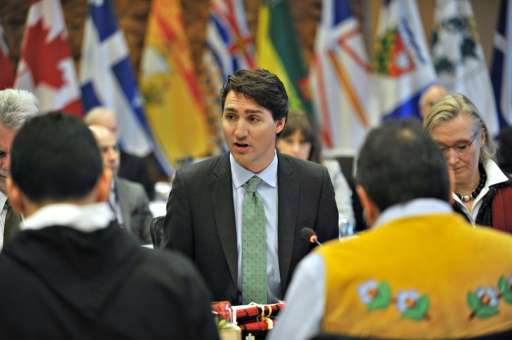Canada gets down to climate business

Canadian Prime Minister Justin Trudeau faced antagonistic provincial leaders at climate talks Thursday over his plans to set a national carbon price in order to meet an international commitment to slash CO2 emissions.
Ten provinces and three territories are represented at the table, each with vastly different economic circumstances and goals, pushing their own tailored approach to reducing greenhouse gas emissions to help keep global temperatures from rising more than 1.5 degrees Celsius.
The target was agreed to at the Paris climate summit late last year.
Going into the meeting, the premier of Newfoundland province, Dwight Ball, highlighted some of the divisions.
The chair of the Council of the Federation—a grouping of provincial and territorial leaders—said: "Carbon management mechanisms (on the table) range from the use of new technologies that mitigate or capture and store carbon, to policies that encourage the market place to reduce or eliminate emissions. That would include setting a price on carbon."
Trudeau put the premiers on notice, reminding them: "We will be working together to develop a vision and a plan to keep our international commitments, something that all premiers accepted in Paris."
Backed by strong public support, the prime minister was expected to push for a national carbon price floor, reportedly about Can$15 per metric ton.
'Not the time'
British Columbia introduced a Can$30 per metric ton carbon tax eight years ago. Alberta province, which is the nation's largest oil-producing region, has pledged to impose a 20 percent carbon tax on large emitters and scale it up as needed.
But neighboring Saskatchewan, which experienced a shale oil and gas boom in recent years, is wary about taking any measures that would "kneecap" the fragile Canadian economy reeling from the oil rout.
"Now is not the time, and I'm not sure the time is going to be right anytime soon," Saskatchewan Premier Brad Wall told reporters Wednesday after meeting with other government leaders.
In the east, Ontario and Quebec have joined a fledgling continental cap and trade system with the US state of California. Here too leaders are circumspect about Ottawa meddling in a provincial jurisdiction—the environment.
"A national carbon price would be a very bad idea and we're staunchly opposed to it," said Quebec Premier Philippe Couillard, flanked at a press conference with Ontario Premier Kathleen Wynne.
There are many ways each of us are fighting climate change and "they must be allowed to proceed," Couillard said.
Trudeau does not want to sow divisions between Canada's regions, notably east versus west. However, addressing climate change, he said, "is one of the great global projects of our time."
"I know Canada is ready to take it on," he added.
© 2016 AFP



















